Capitalism: A Love Story
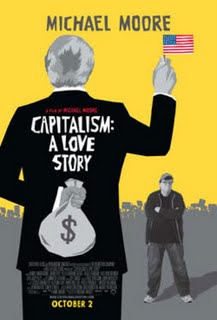 It's not surprising to learn during the course of Michael Moore's latest film that he wanted to be a priest at one point when he was a child. The guy is so passionate about what he talks about, it's easy to picture him as a preacher whipping his followers up into a frenzy. His films are angry rants that reflect his view. There's little if any chance for an outside opinion. I've come to accept this, and know what to expect. His latest film, Capitalism: A Love Story, takes aim at the greed that Moore sees on Wall Street and within the government, and how he feels it is slowly destroying America.
It's not surprising to learn during the course of Michael Moore's latest film that he wanted to be a priest at one point when he was a child. The guy is so passionate about what he talks about, it's easy to picture him as a preacher whipping his followers up into a frenzy. His films are angry rants that reflect his view. There's little if any chance for an outside opinion. I've come to accept this, and know what to expect. His latest film, Capitalism: A Love Story, takes aim at the greed that Moore sees on Wall Street and within the government, and how he feels it is slowly destroying America. He lets you know what he thinks right off the bat, by playing the narration from an old educational film about the fall of the Roman Empire over clips of recent government and financial figures that he feels are leading or has led America to the downward depths. From there, he shows us various families who have had their homes foreclosed over the past year, and are now left to wonder just what went wrong. Whatever you may think of Moore's opinions, you cannot deny that the guy truly believes in what he puts up on the screen, and that a lot of his stuff comes from his heart. He's not going after one man, as in Fahrenheit 9/11, or a certain group, as in Sicko. This time, he seems to be rallying behind the people, and trying to inspire anger within them. Sure, he does this in just about every film he's made, but here, he seems a lot angrier than usual. It harkens back to his debut film, Roger and Me, where he showed the exploits of blue collar workers who were the victims of white collar crooks. This time, he's rallying everyone to question the very nature of Capitalism itself, which he truly feels is evil, and is decaying moral values.
He lets you know what he thinks right off the bat, by playing the narration from an old educational film about the fall of the Roman Empire over clips of recent government and financial figures that he feels are leading or has led America to the downward depths. From there, he shows us various families who have had their homes foreclosed over the past year, and are now left to wonder just what went wrong. Whatever you may think of Moore's opinions, you cannot deny that the guy truly believes in what he puts up on the screen, and that a lot of his stuff comes from his heart. He's not going after one man, as in Fahrenheit 9/11, or a certain group, as in Sicko. This time, he seems to be rallying behind the people, and trying to inspire anger within them. Sure, he does this in just about every film he's made, but here, he seems a lot angrier than usual. It harkens back to his debut film, Roger and Me, where he showed the exploits of blue collar workers who were the victims of white collar crooks. This time, he's rallying everyone to question the very nature of Capitalism itself, which he truly feels is evil, and is decaying moral values.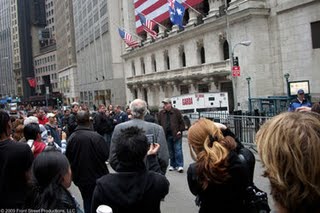 There is no doubt that this is a movie that will inspire conversation by anyone who sees it. Whether you agree or not with what you saw, it will fuel personal fires within its audience. This is a great movie to see with a group of people, and discuss afterward. One of the interesting things about Moore's Capitalism is that no political figure is safe. In his opinion, from the Reagan years on, the American government has been fleecing the public and robbing them blind. This includes key Democrats like Clinton, as well as House and Senate Democratic figures like Pelosi and Reid. One of his personal favorite targets, George W. Bush, gets some heat as well, especially for his part in the bank bailouts last year. Mostly, though, you get the sense that Moore is angry at the system in general, and everyone involved. There is less grandstanding from Moore this time around, as well. He lets the political figures and regular people speak for themselves. But he's still not afraid to add his own spin on things, such as when he comically ridicules Bush's use of fear tactics.
There is no doubt that this is a movie that will inspire conversation by anyone who sees it. Whether you agree or not with what you saw, it will fuel personal fires within its audience. This is a great movie to see with a group of people, and discuss afterward. One of the interesting things about Moore's Capitalism is that no political figure is safe. In his opinion, from the Reagan years on, the American government has been fleecing the public and robbing them blind. This includes key Democrats like Clinton, as well as House and Senate Democratic figures like Pelosi and Reid. One of his personal favorite targets, George W. Bush, gets some heat as well, especially for his part in the bank bailouts last year. Mostly, though, you get the sense that Moore is angry at the system in general, and everyone involved. There is less grandstanding from Moore this time around, as well. He lets the political figures and regular people speak for themselves. But he's still not afraid to add his own spin on things, such as when he comically ridicules Bush's use of fear tactics.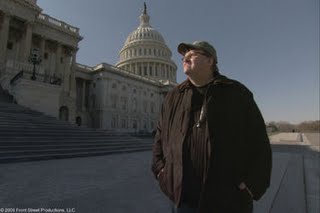 He's also not afraid to show his usual bias and favoritism. He neglects to mention that Barak Obama was for the bailout, although he did call it "distasteful but necessary". Instead, he views the current President as a reform figure, whom the people at Wall Street tried to silence by throwing money around. The fact that Moore does not really try to back up these claims makes us feel that we are listening to opinion, rather than fact. The sequences covering Obama are actually the weakest in the film, as they seem to be handled with the most restraint. Moore had been so acidic and direct in attacking both sides up to this point, and had more or less taken the gloves off, so to speak. Here, the gloves go back on, until it's time to turn attention away from the President. It's an all-too obvious tactic, and one that takes away from some of the power the film generates.
He's also not afraid to show his usual bias and favoritism. He neglects to mention that Barak Obama was for the bailout, although he did call it "distasteful but necessary". Instead, he views the current President as a reform figure, whom the people at Wall Street tried to silence by throwing money around. The fact that Moore does not really try to back up these claims makes us feel that we are listening to opinion, rather than fact. The sequences covering Obama are actually the weakest in the film, as they seem to be handled with the most restraint. Moore had been so acidic and direct in attacking both sides up to this point, and had more or less taken the gloves off, so to speak. Here, the gloves go back on, until it's time to turn attention away from the President. It's an all-too obvious tactic, and one that takes away from some of the power the film generates.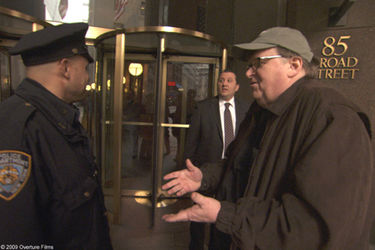 Fortunately, it does not dilute the effectiveness of Capitalism that much. The film is one of Moore's better recent efforts, and he mostly seems to be on his game here. Once again, he expertly mixes humor and anger just about better than anyone out there. He also mainly stays behind the camera, and lets the story tell itself. Aside from a stunt he pulls late in the film, where he visits various corporate headquarters for banks, and tries to make a "citizen's arrest" and tries to get the taxpayer's money back, the focus is not on him. The focus remains on families that have suffered the past year, people who discovered too late that the companies they worked for took life insurance policies out on them and their loved ones, and an overall damning argument of how political and corporate greed has taken over moral decency. Moore is clearly mad as hell, and with this movie, he wants us to be mad as well.
Fortunately, it does not dilute the effectiveness of Capitalism that much. The film is one of Moore's better recent efforts, and he mostly seems to be on his game here. Once again, he expertly mixes humor and anger just about better than anyone out there. He also mainly stays behind the camera, and lets the story tell itself. Aside from a stunt he pulls late in the film, where he visits various corporate headquarters for banks, and tries to make a "citizen's arrest" and tries to get the taxpayer's money back, the focus is not on him. The focus remains on families that have suffered the past year, people who discovered too late that the companies they worked for took life insurance policies out on them and their loved ones, and an overall damning argument of how political and corporate greed has taken over moral decency. Moore is clearly mad as hell, and with this movie, he wants us to be mad as well.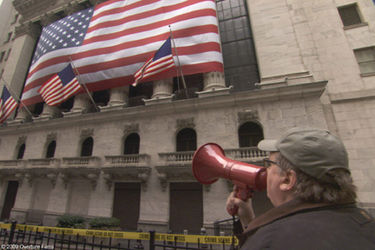
See the movie times in your area or buy the DVD at Amazon.com!






0 Comments:
Post a Comment
<< Home